- Identify and fix problems in database design
- Keep SQL database standards
- Prevent bad database practices
- Friendly licensing model
Keep your SQL Server 7/2000/2005/2008 database free from design flaws with SSW SQL Auditor
Are you looking for a consistent and optimized SQL
Server database?
Maintaining
consistent quality code across a large team can be a challenge. Even when
standards are in place, developers can make mistakes that will slip through
Quality Assurance. SQL Auditor is a part of the range of database tools
designed by SSW to help to check best practice standards and optimize SQL
Server performance. SSW SQL Auditor supports SQL Server
7/2000/2005/2008.
SSW SQL Auditor not only reports on design issues and areas where SQL
performance could be improved, it also has wizards that generate SQL scripts to
correct common problems.
It was developed to assist in performance tuning in SQL
Server 7/2000/2005/2008 by performing a SQL Server
audits on your database. It allows Developers to check their database design against common
SQL Server design rules and report on the elements that do not conform to those
rules.
If you are looking for a DB Auditing Tool that can perform a SQL database audit and
assist with SQL Server performance tuning, download a trial of SSW SQL Auditor
today.
Key Features and Benefits
SSW SQL Auditor is a solution that will globally change the data structure in a
database or range of tables.
By using SSW SQL Auditor's simple wizard interface you
can:
-
Identify and fix problems in database design, eg.
-
Identify any basic technical issues eg. missing primary keys
-
Identify any naming problems
-
Identify Missing relationships
-
More
-
Keep SQL database standards
-
Prevent bad database practices
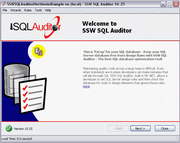 |
Great, user-friendly wizard style interface
With our standards compliant user interface.
|
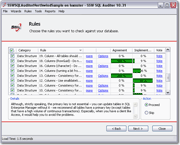 |
Comprehensive rules to keep your database healthy
Learn from the many SQL Rules.
Enable or disable the rules, and learn from the community of SQL developers which rules are popular and
which convention is popular - see Rule Agreement Report
|
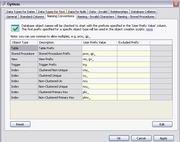 |
Customizable rules
There is a detailed options form which helps you customize rules checking.
|
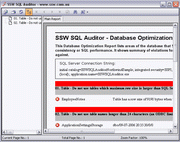 |
Automatically generates a report of the violations for your database
You can get detailed reports of all the violations by a simple click.
|
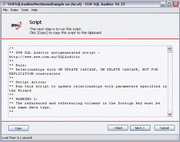 |
Automatically generates scripts
SSW SQL Auditor will automatically generate scripts to correct most of the violations.
|
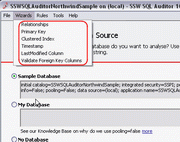 |
Wide-ranging wizards, easy to use
There are 6 different wizards in SQL Auditor now, and there
will be more in future, these wizards will guide you to complete some complicated tasks:
e.g. adding foreign key relationships, adding clustered indexes or adding LastModified columns for appropriate tables.
|
More Technical Features include the ability to:
-
Generate SQL script to create a timestamp column in every Table
-
Check for columns using the ntext and text datatypes
and compare the maximum length of existing data and see a large variance from
current size of varchar(8000)
-
List all rowguid columns that have indexes
-
As Enterprise Manager and Access do not allow you to enter a null in a bit
column. Unfortunately, you can with ADO code. Therefore, the problem occurs when
you have ADO code that enters a record and then if you try to edit the record
in your front end Access application, it will not allow you to save your
changes. Access will say someone else has edited the record since you started
editing (the famous 3 button 'Write Conflict' error)
-
Check for Cascade/Update, Delete/Cascade relationships - especially to see the
relationships without cascading updates turned on.
See more screenshots in the SQL Auditor User Guide.
Upcoming Features
- Add online profile - lists users scans (by PCName_DatabaseName), votes and comments for the rules
- XML based project definition files
- Multi-Databases scan at a time
- Group rules to compliant with different version of SQL Server
How it Works
SSW SQL Auditor allows Developers to check their database design against common
SQL Server design rules and report on the elements that do not conform to those
rules.
SSW SQL Auditor not only reports on design issues and areas where SQL
performance could be improved, it also has wizards that generate SQL scripts to
correct common problems.
Predefined Rules - these are examples of the rules you use
General
-
Object names should not contain spaces. See Object name should follow your company Naming Conventions.
-
Database collation differs from SQL Server collation (server-wide check). See Do you make sure you use a consistent Collation server-wide?
-
Usage of SQL Server reserved words. See Object name should follow your company Naming Conventions.
Data Structure
-
Columns using the Unicode data type of nchar, nvarchar or ntext. See Only use Unicode datatypes (nchar, nvarchar and ntext) in special circumstances.
-
Columns using datetime datatype when data could be stored in a smalldatetime
column. See Use smalldatetime datatype, where possible, instead of datetime datatype.
-
Columns using bit datatype and allowing NULL values. See Do you use Bit/Numeric data type correctly?
-
Columns with RowGuid datatype and an Index. See Do not use indexes on RowGuid column.
-
Tables missing Clustered Index. See Do you create clustered index on your tables?
-
Every table should have Primary Key. See Do you create primary key on your tables?
-
Tables missing Timestamp Column (configure Timestamp column name in the
Timestamp Wizard). See Do you create primary key on your tables?
-
Tables missing "Standard Columns" (user defined columns that all
tables should have). It is definable in Tools -> Options
-
Maximum row size for a table larger than SQL Server data page size (8060 bytes). See
Maximum row size for a table.
-
Table names longer than 24 characters. See Object name should follow your company Naming Conventions.
-
Columns using bit datatype. Recommended to use smallint instead. See Do you use Bit/Numeric data type correctly?
-
Indexes and constraints without a fill factor of 90%. See Use FillFactor of 90% for indexes and constraints.
Relationships
-
Relationships not using ON UPDATE CASCADE. See Use ON UPDATE CASCADE clause when creating relationship.
-
Relationships using ON DELETE CASCADE. See Do not use ON DELETE CASCADE clause when creating relationship.
-
Relationships not using NOT FOR REPLICATION. See Use NOT FOR REPLICATION clause when creating relationship.
Data
-
Data in character type columns having empty line (<Ctrl> + <Enter>)
as the first character
-
Data in character columns having empty string instead of NULL. See Don't allow Nulls in text fields.
-
Data that violates referential integrity
Stored Procedures
-
Stored procedures and Views with unsynchronized names in procedure/view
definition and object name.
-
Stored procedures missing "Standard Stored Procedure Description"
(configure in Tools>Options)
-
User-defined stored procedures starting with "sp_" or "dt_"
The Database Optimization Report lists areas of the database that may be changed
to improve SQL performance. It shows a summary of violations for each rule
database is checked against. Here is a sample report:
System Requirements
What does the unregistered version give me?
In respect to the unregistered version we know you want to see it working before you buy it. We aim for that.
Note: we also give free version targeted to the little guys
For more details see http://www.ssw.com.au/ssw/KB/KB.aspx?KBID=Q658302
SSW provides free phone and email support to answer queries on
registered products.
I'm Sold... What's next?
Microsoft and the Office logo are trademarks or registered trademarks of Microsoft Corporation in the United States and/or other countries.